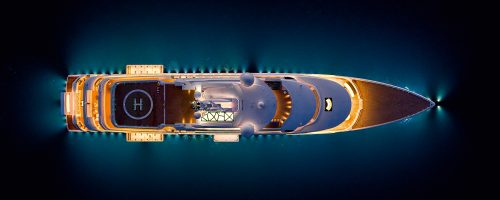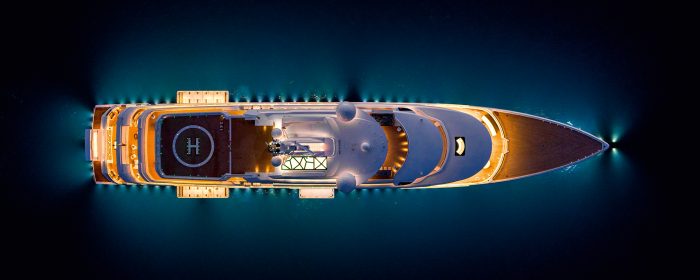https://www.metstrade.com/news/proving-your-eco-authenticity
Kim Hollamby speaks with OceanLED Group Managing Director, Daniele Todaro, to learn how the company is putting its sustainability values into practice and validating its efforts in partnership with the Water Revolution Foundation.

Manufacturers today have never been more keenly aware of the moral, consumer, business, and legislative imperatives to make meaningful step changes toward sustainable product lifecycles. Transforming towards environmentally sensitive practice can be difficult and expensive, but then comes the next question – how do you judge a product as being sustainable? Can you believe or prove that claims for reduced environmental impact are trustworthy?
Many multinational corporations have already been publicly exposed for ‘greenwashing’ – providing misleading or false information about the true impact of their products and services. In the US, court cases against spurious sustainability claims are rising, a trend expected to spread globally.
Validating an environmental investment
The leisure marine industry is not immune from this drive for eco-authenticity. Given that it is an easy target for environmental campaigners, there’s a strong argument that the sector should be pushing hard to prove the efforts it is already making.
Independent, science-based verification at an accessible cost is one objective of the Water Revolution Foundation, a public benefit organisation based in the Netherlands. It grew out of a small group of superyacht industry leaders who shared a belief that the marine industry must change course to better look after the planet and guarantee its future. The Foundation was launched on stage at The Superyacht Forum in 2018, held next door to METSTRADE in RAI Amsterdam, and it partnered with METSTRADE for the first time last year.
One of the Foundation’s key activities involves creating a Database of Sustainable Solutions. Anyone seeking a listing in this online database submits to a Life Cycle Assessment (LCA), conducted by the Foundation. This verification process assesses the cradle-to-grave impacts of a product or service, and is based on United Nations’ Sustainability Development Goals.
Early adopter
One of the first marine equipment manufacturers to embrace this approach was UK-based OceanLED. This underwater lighting specialist has a wide range of applications for small craft up to the largest superyachts. It was looking for a way to validate its sustainable design and production investments independently – not just to achieve a badge or certificate but to have an evidence base for the verification.
OceanLED attained a listing on the Database of Sustainable Solutions in August 2022, for the Explore E8 and E9 underwater lights within its superyacht range. Daniele Todaro, Group Managing Director explains why the company chose to go through this process: “We discovered the Water Revolution Foundation in 2021 and liked the fact that it is independent, with a verification process that includes three accredited scientific institutions that peer review the work.
“At first, we assumed it would be easy to achieve verification because we’d focused on designing sustainable solutions for some time. However, we found it took more effort because you deal with science-based third parties who need a lot of information about how you design, source, manufacture, assemble, distribute, install and service the product and deal with end-of-life. It’s the only way to demonstrate you have a sustainable solution over its whole lifecycle. We even had to show why we thought our product was more sustainable than other options in the marketplace, and that involved a benchmark review against a competitor product.
“It took us a year, but the result was great. It confirmed what we’re doing at OceanLED, which is not only about developing the best technical solutions but also about doing something for our planet.”
Paths to improvement
The verification process is not just about a pass or fail – the Water Revolution Foundation offers feedback for any assessed solution, irrespective of verdict, to enable companies to improve their environmental performance. Daniele explains: “A comprehensive report highlights what you’re doing well and what you should improve. There are several parameters with feedback on scores against each of them.
“Sometimes you assume the verifiers are looking for specific things, but you learn their focus is on other areas that can make a more significant difference. It was interesting because we passed some of the requirements without even knowing it and were surprised to learn that we were doing better than we thought. This kind of feedback is invaluable for more sustainable product development. It’s a live process, too – the Water Revolution Foundation encourages you to keep pushing for improvements.
Manufacturing sustainable products
“The key priorities at OceanLED are quality, performance, and sustainability, Daniele continues. “We know that to develop sustainable solutions, you must use different technologies, and they come at a higher price. We are more than happy to do that because it is a part of our core values as a business.
“Most of our design effort is in-house. When developing more sustainable products, the quality of our optics gives us a head start as that efficiency enables us to use as little power as possible for the required output. We’ve had to shrink the products down to reduce material. We removed cables and introduced a patented connector that took us months to develop. Our sourcing considered use of recycled metals, their origin and how much material could be recycled at end-of-life.
“The product can be disassembled wherever it needs to be serviced or disposed of, using basic non-specialist tools. We use mechanical sealings and not potting compounds – it’s the harder way but all a part of helping the yacht to reduce its carbon footprint while producing the best in-water lighting effect.”
Benefits of proven eco-authenticity
“A key benefit of attaining Sustainable Solution status is the validation of effort that it brings. We pour our heart and soul into making a product better; we want somebody to prove to us and others that what we’ve done has merit while also picking up many nuances of what wasn’t quite so good.”
Regarding tangible benefits, Daniele agrees that reducing materials should bring some cost reduction for each unit. Because raw material costs have skyrocketed, that hasn’t happened in OceanLED’s case, although there may be some longer-term savings when things settle. Some of the more sustainable replacement materials and technologies are more expensive than those used in predecessor models, so halving their use won’t necessarily double the profit.
What about marketing benefits? Does this kind of approach help OceanLED sell more? “It should do,” Daniele responds, “because boat builders committed to sustainability should be looking for verified solutions. However, I think the more important point is we need to start doing something tangible about the environment. I’m hoping initiatives such as this one from the Foundation will push other companies to follow a similar path. We need as an industry to start highlighting the companies within it that care about the planet to counter outside opinions that see us as polluters of it.
“I believe so strongly in building evidence of the industry’s authentic environmental credentials that I would be happy to help our competitors verify themselves. Our experience shows that the starting point is to completely change your mindset as a company, truly investing in sustainability and committing to it, from the board across the whole business.”

